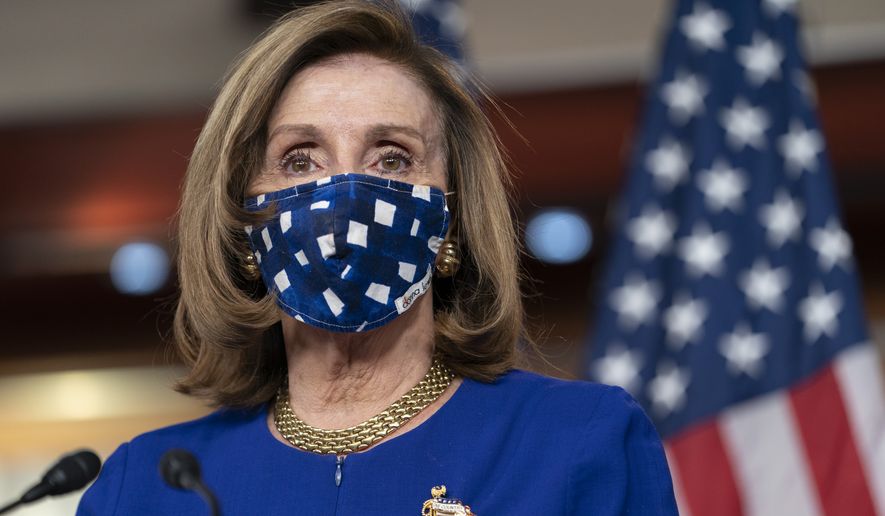House Speaker Nancy Pelosi caved Wednesday on her demand for a $2 trillion-plus coronavirus relief package and endorsed a much smaller bipartisan package as a jumping-off point for new talks.
A deal is still a long way off. Senate Majority Leader Mitch McConnell, Kentucky Republican, is focusing on an even slimmer approach that is preapproved by President Trump.
As recently as Monday, Mrs. Pelosi, California Democrat, and Senate Minority Leader Charles E. Schumer, New York Democrat, were offering a bigger relief package to Republicans than the $908 billion plan they now embrace.
“In the spirit of compromise, we believe the bipartisan framework introduced by senators yesterday should be used as the basis for immediate bipartisan, bicameral negotiations,” they said in a joint statement. “With the imminent availability of the vaccine, it is important for there to be additional funding for distribution to take the vaccine to vaccination.
“In light of the urgency of meeting the needs of the American people and the hope that the vaccine presents, it’s time for Leader McConnell to sit down with Democrats to finally begin a true, bipartisan effort to meet the needs of the country.”
The statement marked the first time Mrs. Pelosi moved off the framework of the Heroes Act, which passed her chamber in September with a price tag of more than $2 trillion.
A previous bipartisan compromise proposal, which was priced at $1.5 trillion to $2 trillion, garnered some interest from the White House, but House Democrats promptly dismissed it as insufficient.
Lawmakers on both sides of the aisle have said progress on a vaccine has increased the urgency for congressional action. They also expect more aid packages after presumed President-elect Joseph R. Biden takes office.
“I think we all know that after the first of the year there’s likely to be a discussion about some additional package of some size next year depending upon what the new administration wants to pursue,” Mr. McConnell said.
The bipartisan, bicameral proposal announced Tuesday would check off some of Mrs. Pelosi’s demands, though with smaller dollar amounts. It would provide:
⦁ $160 billion for state and local governments.
⦁ $288 billion for small-business assistance and the Paycheck Protection Program.
⦁ Short-term protections for businesses against coronavirus-related lawsuits.
It also would supply more funds for a $300 boost to weekly unemployment checks and spend $16 billion on vaccine distribution.
Sen. Joe Manchin III of West Virginia, the most conservative Democrat in the Senate and a member of the bipartisan group that produced the compromise bill, said the legislation could be introduced in both chambers as soon as Monday.
Mr. McConnell is pursuing a much more targeted approach that is similar to the $500 billion bill he put on the floor earlier this year.
The Republican package included funds for schools, vaccine research and small businesses, as well as liability protection. It also would extend the supercharged unemployment benefits by one month, rather than until March as in the bipartisan compromise.
Mr. McConnell did not immediately respond to Mrs. Pelosi’s request for new talks.
Senate Majority Whip John Thune, South Dakota Republican, called the compromise offer from Democrats a good sign.
“That’s definitely progress. It’s a move in the right direction, and I think hopefully it’ll be helpful in us getting a deal done,” he said. “They’ve gotten reasonable, and I think that would help us get to a solution.”
Mr. Thune suggested merging the Republican proposal and the bipartisan framework, even if Republicans would get “heartburn” over the state and local funds.
The proposed federal payouts to state and local governments have been a chief sticking point.
Democrats wanted as much as $500 billion to shore up state and city budgets hit hard by lost tax revenue because of coronavirus shutdowns. Republicans balked at the payments as a “bailout” for Democratic-run states and cities whose budget woes predate the pandemic.
Treasury Secretary Steven T. Mnuchin said the president is willing to get behind the Senate Republican proposal but wouldn’t comment on the other offers.
Sen. John Hoeven, North Dakota Republican and a member of the Appropriations Committee, said his party is discussing options on coronavirus relief while eyeing a Dec. 11 deadline to fund the government and avoid a shutdown.
“We’re kind of talking through these options, but I don’t think it’s been settled as to how we’re going to proceed,” he said. “Then you’ve got to remember, we have to be talking to the administration to make sure it’s something that they’ll support as well as the House.”
Even if lawmakers can iron out a COVID-19 stimulus deal — which there is still a lot of skepticism about on Capitol Hill — they have to get it passed and signed on an extremely tight deadline.
House Majority Leader Steny H. Hoyer, Maryland Democrat, said he and Mr. McConnell agreed that if a deal is going to be passed it should be on paper by the end of the weekend and have been voted on in the House by the end of next week.
That time frame is designed, in part, to allow lawmakers to return home in time to complete a quarantine before Christmas.
“I’m hopeful that in the next few days that we will be able to come to an agreement on a bill that responds to the major crisis, at least in the short term,” Mr. Hoyer told reporters on a conference call. “I know that sounds very optimistic. But in light of the COVID crisis that confronts us, I’m hopeful that members will come to grips with decision-making.”
“There’s no magic about another week. And [Mr. McConnell] agreed on that,” he said.
• Gabriella Muñoz can be reached at gmunoz@washingtontimes.com.




Please read our comment policy before commenting.